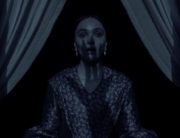Sequence by sequence, Ari Aster has come up with a fantastical, Freudian grab bag of guilt and resentment for his third film. Each section has its own color palette, or better yet, form of despair. Here, any family, biological or found, disappoints or disappears.
In what could be considered the prologue, the graying, balding Beau Wassermann (Joaquin Phoenix) pays a visit to his longtime psychiatrist, in which his first concern is whether or not he could die from accidentally gulping a mouthful of mouthwash. At this, his therapist (Stephen McKinley Henderson) feels his patient is deflecting rather than discussing his impending annual trip to see his mother on the anniversary of his father’s death. With his soft-spoken, genteel manner, the doctor poses a question: Has Beau ever wished his mother were dead? Although Beau may not respond, the film offers a reply.
In the movie’s repellant and riveting first half, Aster builds a world that compiles everyone’s worst fears of 1970s urban life into one war-torn hellscape. (It makes Joker’s Gotham City seem gentrified.) Streets of Beau’s neighborhood are scattered with dead bodies as a rampaging naked man (aka Birthday Boy Stab Man) attacks his latest victims in view of a policeman, no less. It’s a cynical, cynical, cynical world, where bystanders cheer for a suicidal man to jump from the top of a high-rise.
After Beau’s keys and luggage are stolen while his back is turned for a few seconds, he’s terrified of leaving his apartment in this neighborhood—his building is next to the porn store Erectus Ejectus. Not to mention that he has missed his flight; he overslept, having had a hard time sleeping because of the booming bass next door. After he tries to rebook the next flight, his credit card is denied, and when he calls his mother to tell her the news, a stranger answers her phone, the UPS delivery man, who has unsettling news for Beau.
In this nightmarish setup, the direction is at his best when one gag leads to another, which culminates in a deadly chase. The flippant satiric tone carries over into the second chapter, where Beau is cared for by an upper-middle-class family who take him in without question and tend to his multiple wounds from the stabbing by Birthday Boy and from running him over in their SUV. As you may have noticed, Beau is a punching bag, a sad sack, and an easy target for any imagined slight. Sooner rather than later, everyone he encounters turns against him, or meets a grisly fate. Beau’s passive patsy sets off such brutal reactions from others that the film frequently turns into a violent Looney Tunes cartoon.
In a way, Beau returns to his childhood as a surrogate son receiving the loving care and supervision of surgeon Roger (Nathan Lane) and his aptly named wife, Grace (Amy Ryan). They have set him up in their teenage daughter’s bedroom—its pink walls plastered with K-pop posters—for his convalescence, after which they promise to drive him six hours to his mother’s home. Yet like in a fairy tale, Beau is eventually exiled out of this family unit and flees into the dark forest, where he meets a pregnant wood gatherer who invites him to join her traveling troupe of actors. Speaking of fairy tales, there is also a family curse: All of the men in Beau’s family are fated to die in the throes of sex.
Unlike Aster’s Hereditary and Midsommar, Beau Is Afraid is lighter fare, believe it or not, chock-full of sight gags and where the tone remains farcical amid the breakout of violence—this is a different kind of horror show. If the saga becomes overwrought or rambles or becomes too tenuous, its cynical sense of humor at least helps keep pretentions in check. Though this is serious filmmaking, it doesn’t beg to be taken too seriously. (The script was originally a parody, according to the writer/director.)
Aster spends roughly the first 120 minutes setting up a confrontation between Beau and his self-made business mogul mother (Patti LuPone), the prototype of the (fill in the blank) mother: unforgiving, withholding, judgmental, controlling, never pleased. Think Arrested Development’s Lucille Bluth, though sober. For all of the chaos on screen, the formidable LuPone is a bulwark standing tough. In many ways, the movie is all about the mother.
However, the episodic odyssey doesn’t quite sustain its full three-hour duration with such a spineless, passive protagonist at its center, and the script doesn’t offer Phoenix much of a range to play. Slowing down the pace, the camera too longingly lingers on closeups of the bug-eyed, stammering, and frozen Beau and his stolid movements. Though the comedic chaos frequently hits a stride, the momentum deflates, picks up again, and then flags until the ending lands with a thud. (Perhaps Aster had Beau’s journey mapped out first, with no finale in sight.) Like a drug cocktail that the heavily medicated Beau might take, the movie energizes but ultimately enervates.

















Leave A Comment